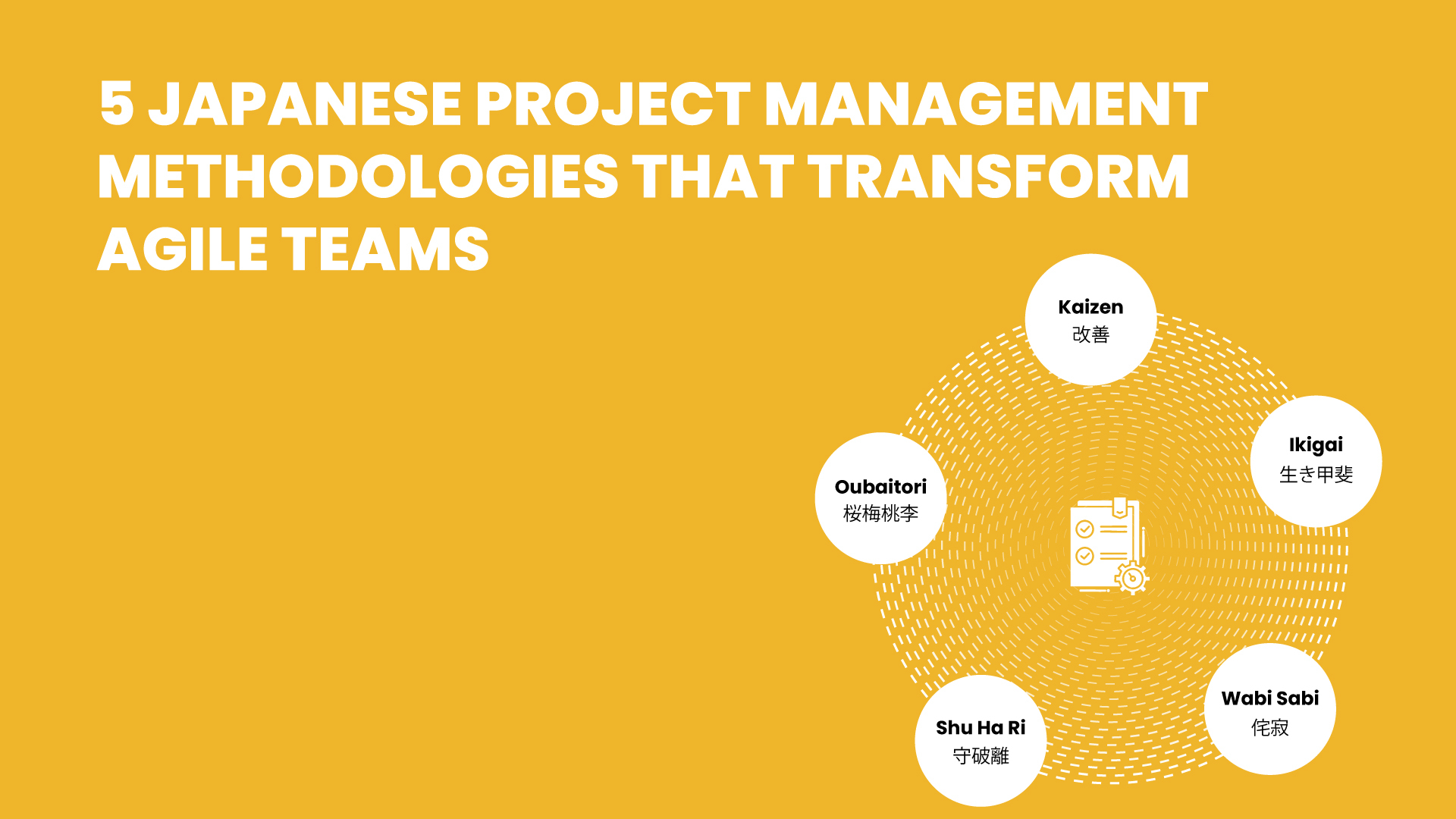

Japanese management culture offers proven project management frameworks that have transformed organizations worldwide. These lean project management principles provide profound methodologies for managing tasks, optimizing team performance, and achieving sustainable business goals.
In this comprehensive guide, we explore 5 key Japanese management techniques that can revolutionize how project management professionals approach their work, integrating continuous improvement and agile project management methods for maximum efficiency. JIITAK specializes in implementing these transformative methodologies to help organizations achieve breakthrough results in their project delivery capabilities.

Ikigai (生き甲斐) translates to "reason for being" and represents the intersection of passion, mission, vocation, and profession. In project management methodologies, Ikigai helps teams maintain momentum by connecting daily tasks to meaningful outcomes.
Purpose-Driven Project Planning: Clearly communicate project vision and ensure every team member understands how their contributions align with organizational goals. This agile methodology approach increases engagement and reduces project abandonment rates. JIITAK's strategic consulting services help organizations establish clear purpose alignment frameworks that drive sustainable project success.
Strength-Based Task Assignment: Match team members' skills and interests with project requirements. This lean project management principle maximizes productivity while fostering job satisfaction and retention. Through JIITAK's talent optimization solutions, teams can leverage individual strengths to create high-performing project environments.
Sustainable Value Delivery: Balance stakeholder requirements with team well-being to ensure long-term project success and prevent burnout in agile project management environments. JIITAK provides comprehensive wellness integration strategies that maintain team performance while promoting sustainable work practices.

Kaizen (改善) is a cornerstone of Japanese management techniques that focuses on incremental improvements. Originally developed by Toyota, this continuous improvement philosophy transforms project outcomes through small, consistent changes.
Incremental Process Optimization: Instead of waiting for major overhauls, implement small improvements throughout project lifecycles. This lean methodology maintains momentum while reducing risks associated with large-scale changes. JIITAK's process improvement consultancy enables organizations to identify and implement high-impact micro-improvements that compound over time.
Team-Wide Innovation Culture: Empower all team members, from junior developers to senior managers, to suggest process improvements. This democratic approach to project management reveals insights that leadership might miss and increases team engagement. JIITAK facilitates cultural transformation workshops that embed continuous improvement mindsets across all organizational levels.
Documented Best Practices: When improvements are identified, standardize and document new processes. This creates a foundation for continuous improvement and prevents regression to less effective methods. Through JIITAK's knowledge management systems, organizations can capture, standardize, and scale successful improvement initiatives.

Oubaitori (桜梅桃李) uses the metaphor of four trees-cherry, plum, peach, and apricot, that bloom in their own seasons. This philosophy eliminates unnecessary comparisons in agile projects.
Strength-Based Team Assessment: Focus on individual and team contributions rather than competitive rankings. This project management methodology improves morale and reduces conflicts between team members and stakeholders. JIITAK's team dynamics optimization services help organizations create collaborative environments where diverse strengths are celebrated and leveraged.
Inclusive Collaboration Culture: Value diverse perspectives and working styles within agile teams. This approach leads to more innovative solutions and higher team satisfaction in lean project management settings. JIITAK provides diversity and inclusion training specifically designed for project management contexts, fostering environments where all team members can contribute their unique value.
Holistic Success Metrics: Measure project success through multiple dimensions rather than single KPIs. This comprehensive view promotes continuous improvement and sustainable project outcomes. Through JIITAK's performance measurement consulting, organizations develop balanced scorecards that capture the full spectrum of project value creation.

Shu Ha Ri (守破離) describes three stages of mastery in martial arts, perfectly applicable to project management professional development:
Foundation Building (Shu): New team members learn established agile project management methods like Scrum, Kanban, or SAFe without deviation. This disciplined approach builds shared understanding and reduces adoption friction. JIITAK's certification programs ensure teams master fundamental methodologies before advancing to customization phases.
Adaptive Customization (Ha): Experienced teams modify project management frameworks to fit their specific context. This stage encourages autonomy while maintaining core lean project management principles. JIITAK provides advanced coaching services that guide teams through framework adaptation while preserving essential effectiveness principles.
Innovation Leadership (Ri): Master-level teams create entirely new approaches aligned with continuous improvement principles. These teams often develop proprietary methodologies that become organizational best practices. Through JIITAK's innovation labs, organizations can develop and test cutting-edge project management approaches tailored to their unique challenges and opportunities.

Wabi Sabi (侘寂) celebrates impermanence and imperfection, valuing authenticity over flawlessness. This philosophy transforms how project management professionals approach delivery timelines and quality standards.
Iterative Delivery Excellence: Accept that projects rarely go exactly as planned. This agile methodology mindset allows teams to adapt quickly rather than pursuing unrealistic perfection that delays valuable deliverables. JIITAK's adaptive project management training helps teams embrace uncertainty while maintaining delivery excellence.
Simplified Process Design: Remove unnecessary complexity from project management processes, features, and communication channels. This lean approach improves clarity, reduces waste, and maintains focus on high-impact activities. JIITAK specializes in process simplification consulting that eliminates bureaucratic overhead while preserving essential project controls.
Change-Adaptive Planning: Recognize that every project phase is temporary. This perspective helps project managers stay flexible, close projects gracefully, and prepare teams for future iterations. Through JIITAK's change management expertise, organizations develop resilient planning approaches that thrive in dynamic business environments.
These Japanese project management methodologies offer more than cultural insight. They provide practical frameworks for today's agile project management challenges. Whether implementing Kaizen's continuous improvement principles, finding team purpose through Ikigai, or embracing Wabi Sabi's acceptance of imperfection, these proven techniques can significantly improve project effectiveness and team satisfaction.
By integrating these Japanese management techniques with modern project management frameworks, organizations can create more resilient, adaptive, and successful project outcomes while fostering sustainable team cultures. JIITAK serves as your strategic partner in this transformation, providing comprehensive implementation support, training, and ongoing optimization services to ensure these methodologies deliver measurable business results.
Ready to transform your project management approach?
Contact JIITAK today to discover how these Japanese methodologies can revolutionize your team's performance and project outcomes. Our expert consultants specialize in seamless integration of these time-tested principles with your existing project management infrastructure, ensuring sustainable transformation that drives long-term success.

.svg)